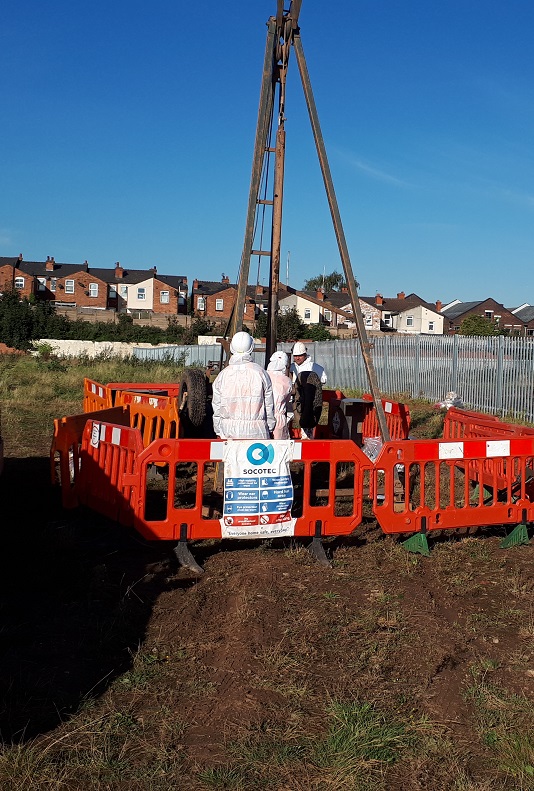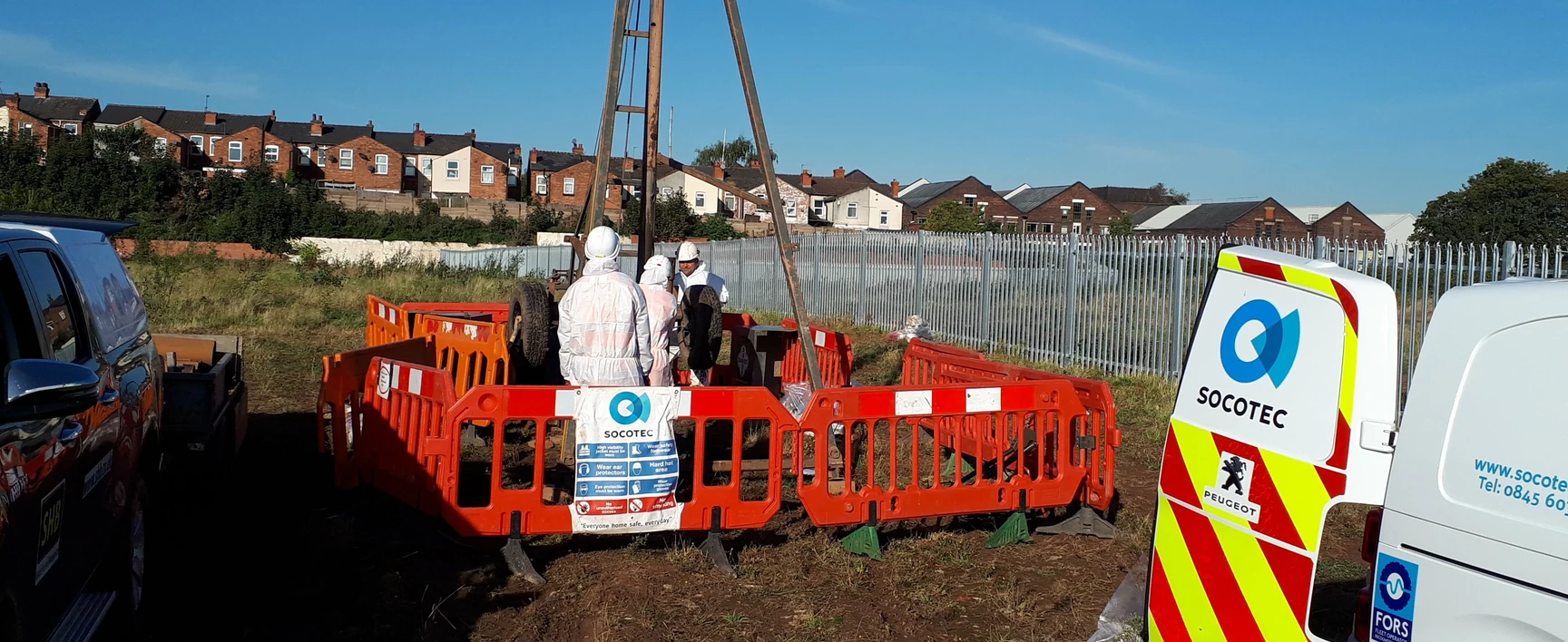Based on their level of technical expertise in the ground investigation sector, SOCOTEC was commissioned to carry out a series of geoenvironmental ground investigations as part of a scheduled major infrastructure remediation project in the West Midlands.
Summary of works
Service: Ground Investigation
Location: West Midlands
Start Date: May 2018
End Date: December 2018
As the sites posed a number of contamination-related risks, it was necessary for the project to incorporate various precautionary measures to protect workers, the underlying natural bedrock, the surrounding environment and the residential community from the potential contamination.
The purpose of the works was to obtain information on the ground conditions, the findings of which would identify areas which required remediation. This would enable the designer to identify the most effective remediation method to eliminate all historical risk of contamination from the ground.

Case Study
Project Details

The works were undertaken between May and December 2018, with SOCOTEC using a variety of exploratory methods to obtain the necessary samples and information. Following a specification issued by the designer, the groundworks in question comprised intrusive investigations, in situ testing, sampling, the installation of monitoring installations and post fieldwork monitoring.
Meanwhile, the exact scope of works comprised:
- Machine excavated trial pits dug to a depth of 6m using a wheeled excavator
- Cable percussive boreholes drilled to 15m below ground level (bgl) using a Dando 2000 drilling rig (aquifer protection measures to be incorporated)
- Rotary cored boreholes drilled to 20m bgl using a Berretta T51 rotary drilling rig
- Window sampler boreholes drilled to 5m bgl using a competitor dart rig
- Instrument installation and post fieldwork monitoring
Upon completion of the fieldworks, the groundwater installations were monitored for gas and groundwater levels over a three-month period, while soil and water samples were analysed via a range of geotechnical and chemical tests.
The works were undertaken between May and December 2018, with SOCOTEC using a variety of exploratory methods to obtain the necessary samples and information. Following a specification issued by the designer, the groundworks in question comprised intrusive investigations, in situ testing, sampling, the installation of monitoring installations and post fieldwork monitoring.
Meanwhile, the exact scope of works comprised:
- Machine excavated trial pits dug to a depth of 6m using a wheeled excavator
- Cable percussive boreholes drilled to 15m below ground level (bgl) using a Dando 2000 drilling rig (aquifer protection measures to be incorporated)
- Rotary cored boreholes drilled to 20m bgl using a Berretta T51 rotary drilling rig
- Window sampler boreholes drilled to 5m bgl using a competitor dart rig
- Instrument installation and post fieldwork monitoring
Upon completion of the fieldworks, the groundwater installations were monitored for gas and groundwater levels over a three-month period, while soil and water samples were analysed via a range of geotechnical and chemical tests.
Previous findings
Prior to commencing works on the project, SOCOTEC had undertaken numerous ground investigations on brownfield sites which had involved the use of different methods of investigation, each of which incorporated various precautionary measures. The organisation was able to use this expertise and experience to plan the works successfully and deliver the project in accordance to the specification, all the while minimising the risks of cross-contamination.
Previous investigations on the sites had already successfully identified contamination within the soil, with samples containing quantifiable levels of asbestos fibres. As a result, the sites in question were designated ‘RED’ due to the environmental risks posed, which meant that all future fieldworks had to be completed in a manner that prevented further cross-contamination of the natural ground and groundwater. In order to control this risk, SOCOTEC implemented a number of measures to ensure that the samples obtained were clean and fully representative of the formation and characteristics associated with soil, rock and groundwater, while also making sure that workers were fully protected from exposure to these contaminants.
Core principles
Firstly, to drastically reduce the amount of dust entering the air and potentially being inhaled, SOCOTEC cored surface concrete using a large diameter diamond drill. Ground materials suspected to be potentially contaminated were then removed to a depth of 1.2m bgl via vacuum extraction. The vacuum extraction truck sucked all of the material out of the ground and into a large hopper, before transporting it to a tipping point for storage ahead of its disposal off site. Certain boreholes encountered significant contamination, requiring the works to be temporarily suspended while additional environmental samples were taken and further information gleaned on the ground conditions. These were analysed at SOCOTEC’s in-house laboratories before the borehole was allowed to progress any further.
Boreholes were drilled from a depth of 1.2m using cable percussion drilling rigs at an initially large diameter to the base of the potentially contaminated material (Made Ground). On reaching the base of the Made Ground, the drilling was stopped and bentonite pellets added. These were hydrated with water and allowed to swell, which provided a ‘seal’ between the Made Ground and underlying natural material. The hole was then progressed further by drilling a smaller diameter casing through the seal and into the natural material beneath, effectively preventing any material from being cross-contaminated.
Upon reaching the bedrock, the drilling rig was switched to a rotary coring rig which progressed the borehole to termination depth. Trial pits were excavated using wheeled excavators and terminated within the Made Ground materials, which also prevented any cross-contamination of the underlying natural ground.
Preventative measures
As with all of SOCOTEC’s ground investigation projects, workers were required to wear their standard personal protective equipment, in addition to disposal Tyvek suits, gloves, eye protection and FFP3 fitted face masks to protect against the inhalation of asbestos fibres. In instances where significant contamination was encountered, the face masks were upgraded to full face fitted respirator masks.
SOCOTEC implemented preventative controls to monitor the conditions of the surrounding environment, which included air monitoring on a daily basis to identify any airborne asbestos fibres. Frequent swabbing of the equipment was also carried out, as in the event of any asbestos fibres being discovered, the works would have been stopped.
Likewise, all arisings from boreholes were contained in bunded work areas and drilling fluids were prevented from running onto the ground surface. This provided further protection to the surrounding environment and workers, as well as preventing additional cross-contamination from taking place. Decontamination units were also positioned around the sites to provide a safe and clean place to workers in case anyone came into contact with any harmful contaminants.
Project findings
Once all of the necessary fieldwork had been carried out across all sites, the equipment was decontaminated on site, with all runoff, arisings, liquids, soils and disposable PPE properly disposed of away from the premises. Moreover, following completion of the works, it is worth noting that the levels of asbestos and other contaminants within the ground across the sites were discovered to be far lower than expected. This enabled the client to design the appropriate remediation works for each of the sites, laying the foundations for this particular stage of the infrastructure project to get underway.
Clare Chapman, operations director for SOCOTEC’s Ground Investigation division, commented: “We were extremely pleased to have contributed to this major infrastructure project in the West Midlands, which is set to benefit not only the local community but also vastly improve transportation links across the UK. Our adaptable approach and technical expertise meant that we were able to deliver representative, quality results that provided critical information on the surrounding environment and how it can be protected moving forward.”



